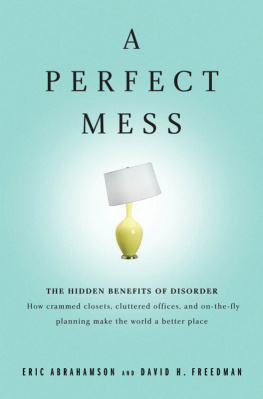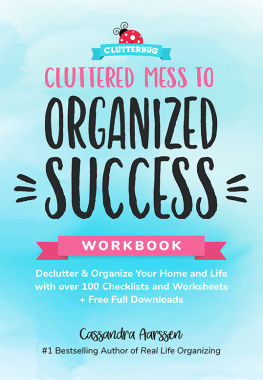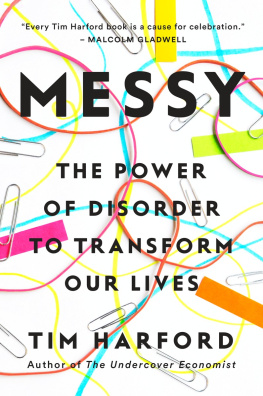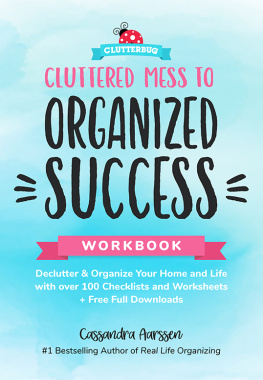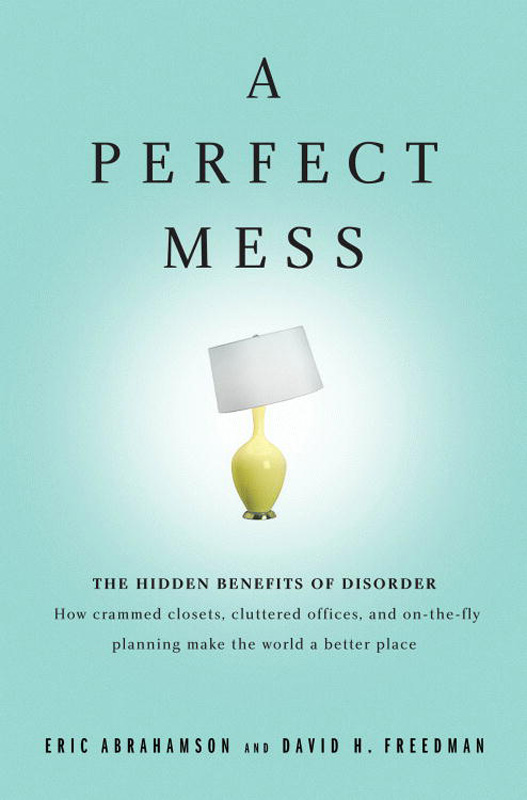Copyright 2006 by Eric Abrahamson and David H. Freedman
All rights reserved. Except as permitted under the U.S. Copyright Act of 1976, no part of this publication may be reproduced, distributed, or transmitted in any form or by any means, or stored in a database or retrieval system, without the prior written permission of the publisher.
Little, Brown and Company
Hachette Book Group USA
237 Park Avenue, New York, NY 10017
Visit our Web site at www.HachetteBookGroupUSA.com
First eBook Edition: January 2007
ISBN: 978-0-7595-1649-6
ALSO BY ERIC ABRAHAMSON
Change Without Pain: How Managers Can Overcome
Initiative Overload, Organizational Chaos, and Employee Burnout
ALSO BY DAVID H. Freedman
Corps Business: The 30 Management Principles of the U.S. Marines
At Large: The Strange Case of the Worlds Biggest Internet Invasion,
coauthored with Charles C. Mann,
Brainmakers: How Scientists Are Moving Beyond Computers to
Create a Rival to the Human Brain
For my wife, Valerie, and my children,
Alex and Claire.EA
and
For messmasters Laurie, Rachel,
Alex, and Jason.DHF
T heres a spot on Broadway in Manhattan where two magazine stores used to sit across the street from each other. One of the stores featured neat racks of impeccably arranged magazines, any copy of which could be tracked by computer. At the other store, magazines were sometimes scattered about randomly, with Cosmopolitan snuggled up against Fortune; Real Simple alongside Jet; and Smithsonian elbowing Psychotronic. No wonder: Essam, the owner and manager of the messy store, had no computer inventory system to tell him what he sold or which magazines needed restocking. He and his assistant, Zak, operated from memory and straightened up as best they could during quiet periods and at the end of the day.
Not surprisingly, the first store attracted more customers and did a brisker business, selling more magazines than Essams. Equally unsurprising, only one store remains in business today, the other having been shuttered by losses. But theres a strange punch line: Essams store is the one still flourishing. He didnt sell as many magazines as his former competitor, but he made more money. The simple reason is that he avoided some of the profit-devouring costs associated with the extra staff his competitor felt it needed to straighten up its racks, as well as the computerized inventory systems it needed to track magazines. Given that profit, not to mention survival, is a reasonable measuring stick of business effectiveness, its fair to say that any benefits the other store might have accrued by being neater and more organized were outweighed by their associated costs. In other words, one reason Essams store has been successful is because its messy.
Its not all that hard to understand how Essam manages to profit, in a sense, from mess. Perhaps it doesnt even seem particularly remarkable once its pointed out. But suppose that this comparison of the magazine stores isnt merely an interesting curiosity. What if the costs of being neat and well organized often outweigh the benefits? What if being somewhat messy, in a broad sense, is a better deal?
It sounds almost ridiculous to suggest that the world has been ignoring the fairly obvious concept that theres a cost to being neat and organized. Youd think that the first question people and organizations would ask themselves before embarking on an effort to straighten up and muster more order would be: will this be worth what it costs me in time and other resources? After all, the idea that organizing doesnt always pay off would have to come as stunning news to offices that have everything filed away neatly, schools with rigidly detailed curricula and standards, professionals who keep their days tightly scheduled, companies that obsessively spell out management and operational procedures, parents who are constantly fighting clutter, militaries that maintain rigid groupings, and city governments that generate volumes of codes.
In fact, neatness and organization can exact a high price, and its widely unaccounted for. Or to put it another way, there are often significant cost savings to be had by tolerating a certain level of messiness and disorder. But this book is going to show that the disconnect is even more striking. Its not just that the advantages of being neat and organized are typically outweighed by the costs. As it turns out, the very advantages themselves are often illusory. Though it flies in the face of almost universally accepted wisdom, moderately disorganized people, institutions, and systems frequently turn out to be more efficient, more resilient, more creative, and in general more effective than highly organized ones. Just as the cost of neatness has been ignored, so have the potential benefits of achieving the right level and type of mess. While beneficial disorder may not be the rule, it isnt much of an exception, either.
That messiness and disorder can be so useful wouldnt seem such a counterintuitive notion if it werent for the bias toward neatness programmed into most of us. Specifically, people tend to ignore the cost of neatness, discount the possibility that messiness cant always be excised no matter how hard its fought, and distrust the idea that mess can work better than neatness. Neatness for most of us has become an end in and of itself. When people are anxious about their messy homes and offices or their disorganized schedules, its often not because the messiness and disorder are causing problems, but because people simply assume they should be neater and more organized and feel bad that they arent.
This notion that mess and disorder might be harmless or even beneficial shouldnt seem such a strange one. But almost every practical exploration of how we can improve our lives, businesses, and societies suggests ways to be either more ordered or differently ordered. Being disorderedand not just less centrally or hierarchically orderedrarely comes up for consideration. Its time that we take an open-minded look at messiness in all aspects of our lives and institutions, and consider where it might best be celebrated rather than avoided.
The pages ahead compose a representative tour of the underappreciated side of the world of mess and disorder. Among the stops: the messiest house ever; a preschool where toy-smashing is welcome; a hardware shop and a bookstore that thrive on making it hard to find goods; the utterly disorganized life of Arnold Schwarzenegger; a hospital where patients throw pizza parties; the Beethoven symphony that is often played out of tune; the desk mess that led to a Nobel Prize; a restaurant that serves courses out of order; and the U.S. city whose messiness makes it kin to historic Paris. The point of the tour isnt to be comprehensive on the subject of mess and disorder. Hardly; any facet of the subject could easily fill volumes. Rather, the goal is simply to explore and highlight some important truths about disorder that have mostly been overlooked.
You may find that the tour takes some unexpected turns. At least we hope you do.
The Cost of Neatness
If a cluttered desk is a sign of a cluttered mind,
of what then, is an empty desk?
Albert Einstein
K athy Waddill is telling a standing-room-only house of several hundred rapt professionals, most of whom are taking notes on broad yellow lined pads sheathed in expensive- and complex-looking leather binders, about the deep client discomfort they should be prepared to confront when setting up a first visit over the phone. Im the worst youve ever seen, Waddill imitates, her voice husky with emotion before it breaks to a mortified whisper. Im overwhelmed. Im so embarrassed.

